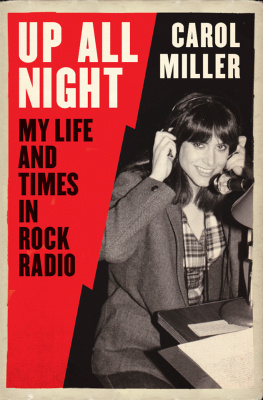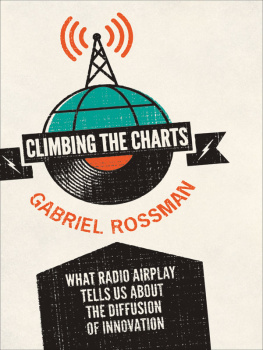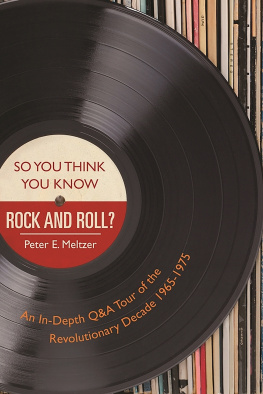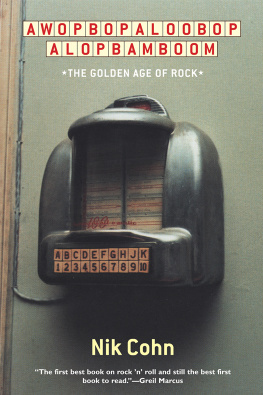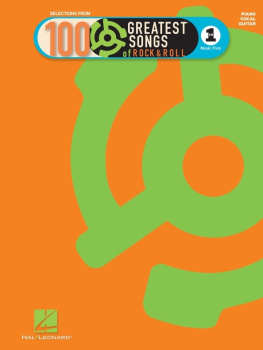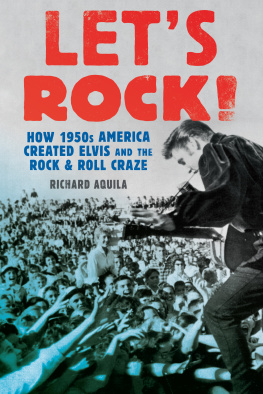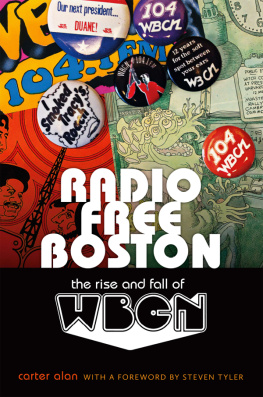ACKNOWLEDGMENTS
In addition to being main actors in creating the phenomenon of progressive radio, the following people were vital contributors in telling this story, submitting to hours of questions, reliving good times, and having the courage to recount the tough ones:
From WNEW-FMScott Muni, Bill Rosko Mercer, Dave Herman, Jonathan Schwartz, John Zacherle, Dennis Elsas, Tony Pigg, Marty Martinez, Vicky Callahan, Peter Larkin, Vin Scelsa, Ken Dashow, Jim Monaghan, and Dan Neer.
Terry Malia from Mel Karmazins office. Charles Laquidara and Marc Parenteau, once of WBCN. Charlie Kendall of Click Radio. Ted Utz of SFX. Jo Maeder of many stations. Mark Chernoff at WFAN. Bonnie Simmons, once of KSAN. Michael Harrison of Talkers magazine. Bruce Morrow, a radio legend who gave freely of his time and advice. Lee Abrams and Dave Logan of XM. The Museum of Television and Radio. Kid Leo and Jim DelBalzo of Sony Records. Steve Friedman of CBS. Steven Silvio Van Zandt for constant inspiration.
To my father for introducing me to radio and my mother for her many sacrifices along the way.
Im greatly indebted to my editor, Bruce Tracy, and all the folks at VillardKatie Zug, Janet Wygal, and Diane Frostwho guided me through the process.
Special thanks to David Black, who convinced me that there was a story to be told and had faith in my ability to tell it.
ABOUT THE AUTHOR
Richard Neer started in radio while attending Adelphi University and pioneered progressive radio on Long Island after graduation. In 1971, he joined the staff of WNEW-FM and worked there as a disc jockey and programmer for over twenty-eight years. In 1986, he became a sports talk-show host at WNEW-AM. He moved to WFAN in July of 1988, where he is currently a weekend personality and pre- and postgame host for New York Giants football. He is the sports editor for Talkers magazine and appears regularly on various syndicated radio and television shows. He lives in New Jersey with his wife, Vicky, and their willful golden retriever, Lindsay.
The Promise
I lay awake for a sunrise that never broke through the clouds. I hadnt slept much the night before. Most of the weekend I had been awake, preparing for todaythe most important day of my lifeall twenty-one years of it.
Not every day you think is going to be pivotal toward your future turns out that way. How often do life-changing days happen with no warning, no chance to prepare? An anonymous driver swerves into your lane. An unknown IRS agent decides that you are the one to be audited. The results of a PSA test come in. Or on the plus sidethe lottery calls your number. A major headhunter hears from an old college chum that you are the perfect candidate to head a large corporation. The dot-com stock you buy early is unexpectedly acquired by Microsoft.
But this Monday morning in March of 1971, I was sure that in a few hours the course of my life and that of my best friend would be changed. Michael Harrison and I lived in a small apartment above a bakery in Oceanside, Long Island, and had shared many adventures together. For the past two years, he and I had put in sixteen-hour days at WLIR-FM, a small suburban radio station. Wed slept at the station more nights than we cared to remember, sometimes because we were working late, sometimes because we had no place to live. Wed missed meals, desperately trying to make it until the next paycheck with only change in our pockets. Wed often devote hours to meticulous strategy planning, designed to convince our boss at WLIR that we merited an extra twenty-five cents per hour.
We made these sacrifices for one ultimate goal: to get a job at WNEW-FMreal New York radio, with studios in Manhattan, where the stars of every type of showbiz lived and played. And now this day could be the payoff for those months of deprivation, or it could sentence us to a longer term of penance before we could deserve another shot at nirvana.
In 1971, the absolute coolest place to work in radio was WNEW-FM. The disc jockeys had total freedom to play whatever records they chose. They could say what they wanted, whenever they wanted. They didnt need to put on ballsy radio voices; they spoke like real people, with regional accents or immature timbres. Some were intelligent, others sexy or funny. They brought themselves to the airwaves unvarnishedwhat you heard was what they were.
They made comfortable salaries, although not the megabucks of AM radio superstars. They came from different places, different experiences. Some were veterans of the Top Forty wars whod tired of the battle, some were freshly out of college and idealistically striving to reinvent a medium that had grown old and irrelevant. A couple were entertainers from other fields who had sought to be actors or poets, but found a haven in a darkened studio behind a microphone. Some were handsome, some had been cursed with faces made for radio. But collectively, they formed a dream team that the cognoscenti acknowledged as the industrys pinnacle. And due to a unique set of circumstances, Harrison and I had talked ourselves into believing that we were ready to join their ranks.
Wed had two opportunities over the past year, but theyd proven ephemeral. There was our unsuccessful attempt to get to WNEW-FM through a side entrance by beseeching Metromedia Group president George Duncan for a job at one of the companys out-of-town outlets. Duncan presided over several stations, in places like Philadelphia, Los Angeles, and San Francisco, as well as New York. We figured if we could impress the company at one of its far outposts, we might earn a ticket back to WNEW-FM within a reasonable period of time. But wed blown the interview with Duncan.
At the time, John Lennon had released a song called Working Class Hero. It was a bitter, self-deprecating view of his life and the whole idea of being known as an ex-Beatle. It contains the line, Youre still fucking peasants as far as I can see. Many underground stations were playing it. Some bleeped out the offending lyric, some reversed the word, and a few played it uncensored.
The FCC was not happy with progressive radio: Richard Nixon was constantly vilified and its strident antiwar political bent chafed the administration. As we now know, the president didnt hesitate to punish his enemies with whatever means were at his disposal. The FCC issued warnings that licenses could be at stake if lyric content was deemed objectionableeither obscene or condoning illicit activity, mainly drug use. In fear of governmental discipline, George Duncan had banned innocuous songs like Brewer and Shipleys One Toke over the Line, or the Grateful Deads Uncle Johns Band (containing the phrase Goddamn, well I declare). Though he could be profane himself, he didnt want anything to endanger the Metromedia broadcast empire.
But we werent aware of this conservative approach and when Duncan casually brought up Working Class Hero, asking how we were handling it at WLIR-FM, I blurted out, Were playing it uncut. Our audience deserves to hear an artist like John Lennon as he intends to be heard. And the songs message is far from obscene.
The interview continued for a few minutes thereafter, but my impulsive answer troubled me the rest of the way. Duncan graciously said that changes were always happening at Metromedia, so that even though nothing was available now, hed consider us in the future. Several months had passed and we hadnt heard anything, so we assumed we were out of the running.
Wed also interviewed at CBS, another company that controlled radio stations, although none so desirable as Metromedias stable of progressive stations. CBS held on to vestiges of conventional AM radio: a more upbeat, insincere style with music that was programmed by one director; the individual jocks holding no sway over what they played. Our strategy was to take over one of their less profitable stations and build it up to the point that Metromedia would have to take notice and hire us away.
Next page

